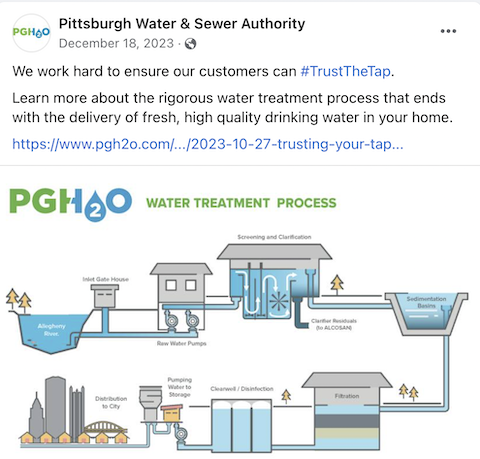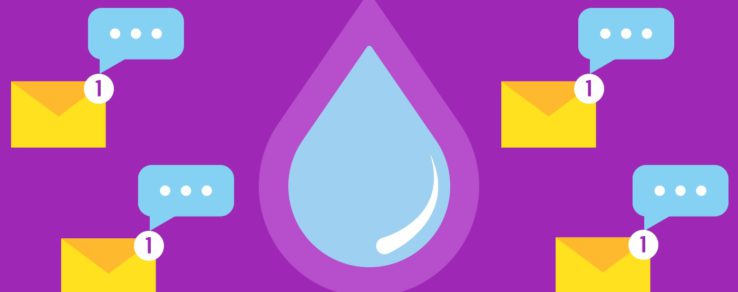Communicating to water customers is essential to build trust, loyalty and greater awareness about water conservation and safety. For water utility marketers, communications require a unique mix of transparent information, reliable resources and customer education.
Most customers don’t think about their water until they receive their monthly bill or experience a service disruption. By connecting with customers beyond these scenarios, water utilities can build stronger customer relationships.
Proactive Outreach Increases Water Customer Satisfaction
Even in an environment of rising rates, water utilities have experienced greater customer satisfaction. J.D. Power’s latest U.S. Water Utility Residential Customer Satisfaction Survey found that overall customer satisfaction with water utilities rose 3 points (on a 1,000-point scale) even with bill increases.
Proactive communications were the main factor for greater customer satisfaction. Utilities were communicating to water customers throughout the year about pricing, quality, safety and supply topics.
“With monthly rates continuing to rise and the water supply running dangerously low in many parts of the country, there has never been a more critical time for water utilities to proactively communicate with their customers about what they are doing to protect our drinking water today and into the future,” Andrew Heath, Senior Director of Utilities Intelligence at J.D. Power, said in a news release.
What Are the Most Important Water Utility Topics?
From infrastructure projects to water conservation initiatives, utilities have important information they need to share with customers. Following the best water utility communication practices means prioritizing the key topics to share with their customers.
Important water utility topics include:
- Quality and safety
- Conservation
- Reliability
- Bill assistance
1. Water quality and safety
Today’s consumers may be skeptical about the quality of their tap water. For water utilities, misconceptions about tap water safety and quality can be significant challenges to overcome. Plus, there are more alternative water options than ever before, such as bottled water and in-store water purification machines.
When communicating to water customers, utilities should be transparent about water treatment processes, quality testing and other quality control measures. Water utilities can build trust with customers by sharing step-by-step processes and water quality reports.
2. Water conservation
According to the U.S. Environmental Protection Agency (EPA), Americans use around 82 gallons of water every day in their homes. One of the best water utility communication practices is providing educational resources to help customers reduce their water usage.
Water conservation requires customers to be active participants. Utilities are looking to both residential and business customers to help prevent water shortages in the future.
These conservation efforts include reducing outdoor irrigation system usage, being mindful of household leaks and installing water-efficient fixtures and appliances. In fact, installing water-efficient products can help customers use at least 20% less water.
When communicating to water customers about water conservation, water utilities need to capture attention with eye-catching visuals, easy-to-understand messaging and clear call-to-actions.
3. Water reliability
Customers want to be assured that their water service is reliable, now and in the future. Water utility communication practices related to reliability can bring peace of mind, whether resources on conversation measures, treatment capabilities, or infrastructure improvements.
Water utilities across the country are communicating to water customers about improvements to drinking water, wastewater and stormwater infrastructure. This is especially important for parts of the country with aging infrastructure.
In regions where water supply may be a concern, water utilities must communicate city initiatives to prevent water shortages and ensure long-term water reliability.
4. Water bill assistance
Another focus area for water utilities is communicating to customers in need about financial assistance options. In the same way that electric and natural gas utilities provide assistance resources, water utilities also need to focus on helping customers facing financial hardship.
Water utility communication practices might include email campaigns that educate customers on assistance programs or text messages that direct low-income customers to online resources. Community events, where utility employees can speak with customers face-to-face about ways to reduce water usage, are also beneficial.
Educating and Engaging with Water Customers
Communicating to water customers can take the form of an educational fact sheet or an entertaining commercial. Keep in mind, many water utility topics can be complicated for customers to understand. It behooves utilities to simplify technical jargon and explain topics in easy-to-understand language.
For example, Pittsburgh Water and Sewer Authority’s communication team created a “Trust the Tap” marketing campaign to increase awareness about the city’s water quality. The campaign features fact sheets and social media posts with easy-to-understand infographics that highlight each step in the water treatment process. Later this year, the campaign will also include animated videos to educate customers on water quality.

An essential water utility communication practice to consider is using a multichannel approach to marketing campaigns. Outreach channels could include bill inserts, email marketing, social media and local TV stations.
For example, the Las Vegas Valley Water District, in partnership with the Southern Nevada Water Authority, takes advantage of paid media ad placements centered around water conservation and water quality.
In the Las Vegas area, residential customers must follow mandatory watering restrictions to limit landscape irrigation, as well as prevent water waste on their property. The ads were created to educate customers on:
- Current and new water conservation measures
- Why those conservation measures are important
- How these conservation measures will impact customers
- What actions customers need to take
The ads employ humor to communicate to water customers about important conservation measures they need to take, such as changing their sprinkler clock and paying attention to seasonal water restrictions. In true Las Vegas fashion, the ads captured attention with their entertaining, eye-catching and comedic style. One ad even featured Vegas Golden Knights hockey player Ryan Reaves.
The Key to Successful Water Customer Communications
Water utilities provide an essential service to their local communities. Educating and engaging communications can motivate customers to take action, whether reducing their water usage or applying for bill assistance. Communicating to water customers can go a long way to increase education on water safety, quality and reliability.

